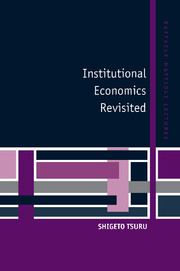Book contents
- Frontmatter
- Contents
- Preface
- Institutional Economics Revisited
- CHAPTER ONE Reappraisal of Marxian Political Economy as ‘Institutionalism’ in the Broad sense of the Term
- CHAPTER TWO The Methodology of Aggregates: Keynes vs. Marx
- CHAPTER THREE Marx vs. Schumpeter on Business Cycles
- CHAPTER FOUR Institutional Economics in America: Veblen
- CHAPTER FIVE Modern Institutionalism
- CHAPTER SIX The Future of Institutional Economics I: In Place of GNP
- CHAPTER SEVEN The Future of Institutional Economics II: The Mixed Economy as a Mode of Production
- DISCUSSION, AND COMMENTS, BY SHIGETO TSURU
- BIOGRAPHY OF SHIGETO TSURU
- References
- Index
CHAPTER THREE - Marx vs. Schumpeter on Business Cycles
Published online by Cambridge University Press: 13 May 2010
- Frontmatter
- Contents
- Preface
- Institutional Economics Revisited
- CHAPTER ONE Reappraisal of Marxian Political Economy as ‘Institutionalism’ in the Broad sense of the Term
- CHAPTER TWO The Methodology of Aggregates: Keynes vs. Marx
- CHAPTER THREE Marx vs. Schumpeter on Business Cycles
- CHAPTER FOUR Institutional Economics in America: Veblen
- CHAPTER FIVE Modern Institutionalism
- CHAPTER SIX The Future of Institutional Economics I: In Place of GNP
- CHAPTER SEVEN The Future of Institutional Economics II: The Mixed Economy as a Mode of Production
- DISCUSSION, AND COMMENTS, BY SHIGETO TSURU
- BIOGRAPHY OF SHIGETO TSURU
- References
- Index
Summary
Let me quote a paragraph which sounds very much like the one written by an institutional economist:
The capitalist process not only destroys its own institutional framework but it also creates the conditions for another … The outcome of the process is not simply a void that could be filled by whatever might happen to turn up; things and souls are transformed in such a way as to become increasingly amenable to the socialist form of life. With every peg from under the capitalist structure vanishes an impossibility of the socialist plan.
This is from the pen of none other than J. A. Schumpeter who, as a self-confessed admirer of ‘elegance’ in theoretical constructs, is seldom identified in the camp of institutional economists. Furthermore, his inclination toward historical analysis is more clearly stated in the opening chapter of his posthumous work as follows:
What distinguishes the ‘scientific’ economist from all the other people who think, talk, and write about economic topics is a command of techniques that we class under three heads: history, statistics, and ‘theory’. The three together make up what we shall call economic analysis.
Of these fundamental fields, economic history – which issues into and includes present-day facts – is by far the most important. I wish to state right now that if, starting my work in economics afresh, I were told that I could study only one of these three but could have my choice, it would be economic history that I should choose. And this on three grounds. First, the subject matter of economics is essentially a unique process in historic time. […]
- Type
- Chapter
- Information
- Institutional Economics Revisited , pp. 41 - 58Publisher: Cambridge University PressPrint publication year: 1993
- 2
- Cited by

